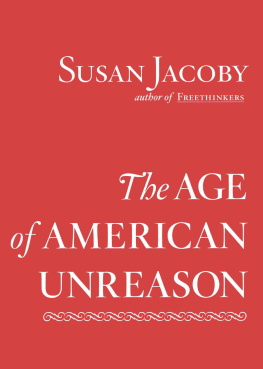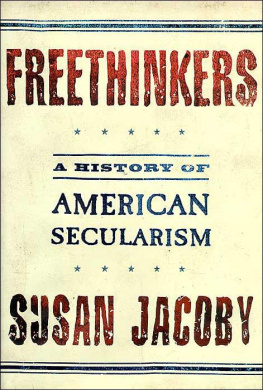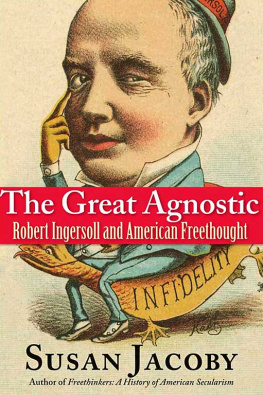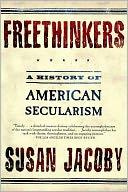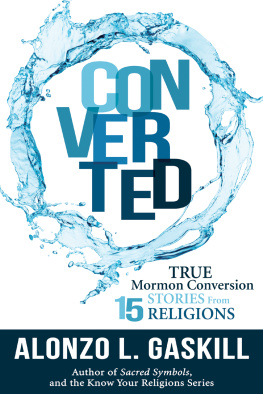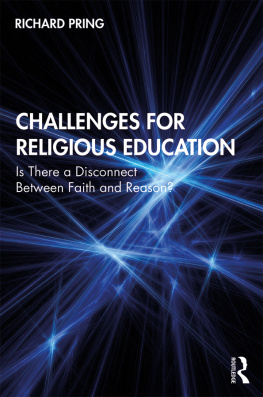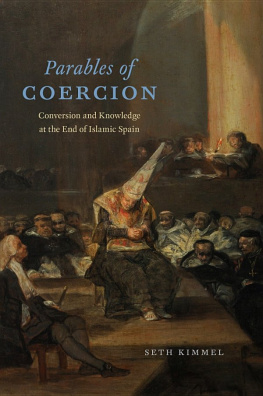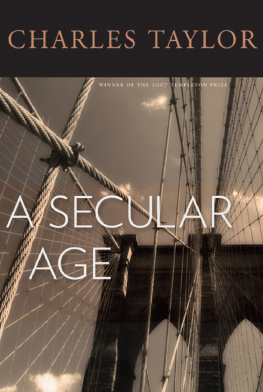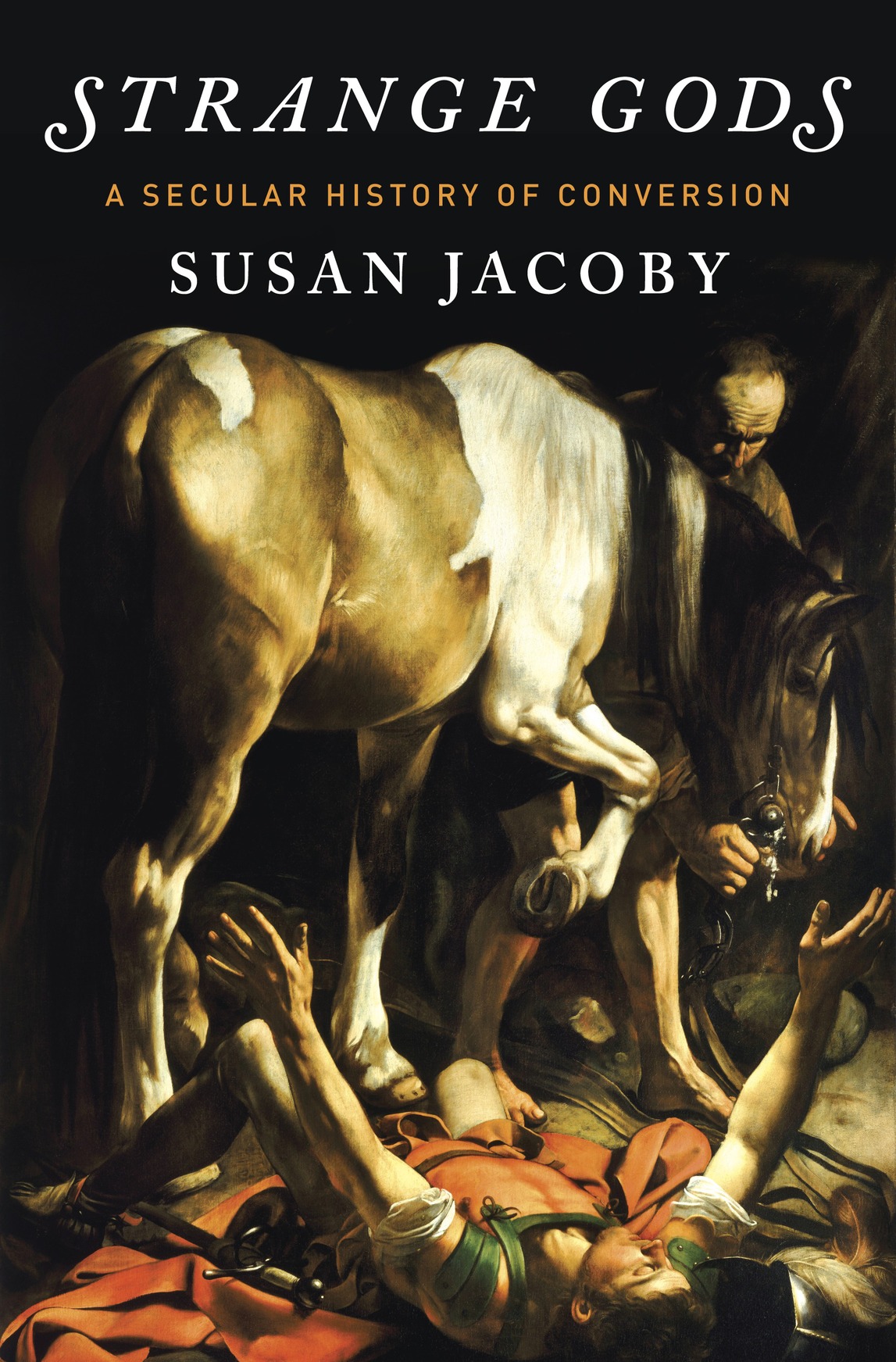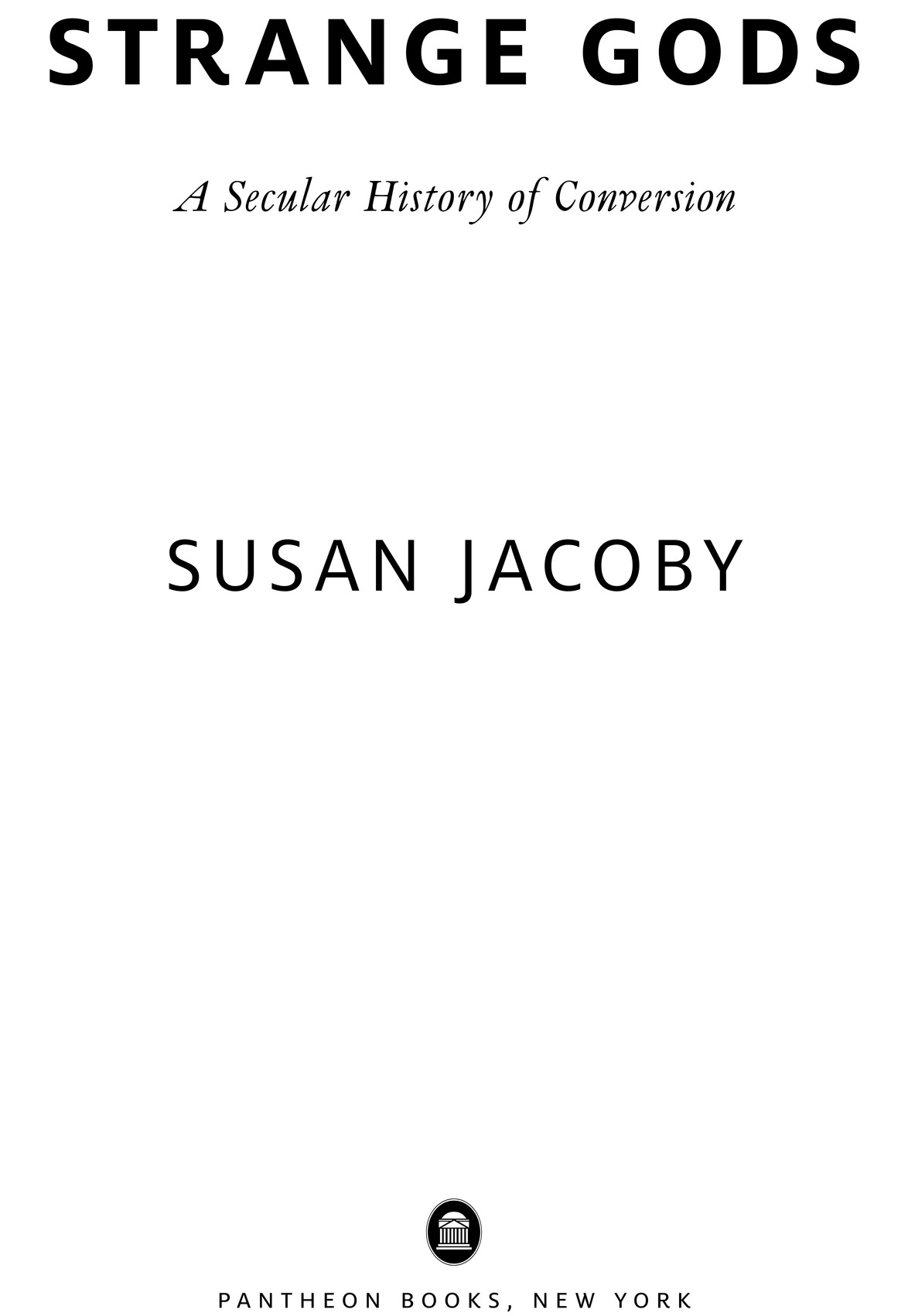ALSO BY SUSAN JACOBY
The Last Men on Top
The Great Agnostic: Robert Ingersoll and American Freethought
Never Say Die: The Myth and Marketing of the New Old Age
Alger Hiss and the Battle for History
The Age of American Unreason
Freethinkers: A History of American Secularism
Half-Jew: A Daughters Search for Her Familys Buried Past
Wild Justice: The Evolution of Revenge
The Possible She
Inside Soviet Schools
Moscow Conversations
Copyright 2016 by Susan Jacoby
All rights reserved. Published in the United States by Pantheon Books, a division of Penguin Random House LLC, New York, and distributed in Canada by Random House of Canada, a division of Penguin Random House Canada Ltd., Toronto.
Pantheon Books and colophon are registered trademarks of Penguin Random House LLC.
Grateful acknowledgment is made to ICS Publications for permission to reprint an excerpt from Life in a Jewish Family by Edith Stein, translated by Josephine Koeppel, O.C.D., copyright 1986 by Washington Province of Discalced Carmelites. Reprinted by permission of ICS Publications, 2131 Lincoln Road, N.E., Washington, D.C. 20002-1199 (www.icspublications.org).
Library of Congress Cataloging-in-Publication Data
Jacoby, Susan, [date]
Strange gods : a secular history of conversion / Susan Jacoby.
pages ; cm
Includes bibliographical references and index.
ISBN 978-0-375-42375-8 (hardcover : alk. paper). ISBN 978-1-101-87096-9 (eBook).
1. ConversionHistory. I. Title.
BL 639. J 33 2016 204'.2dc23 2015019062
eBook ISBN9781101870969
www.pantheonbooks.com
Cover image: The Conversion of St. Paul, 1601, by Caravaggio. Santa Maria del Popolo, Rome, Italy/Bridgeman Images
Cover design by Kelly Blair
v4.1
ep
Contents
For Rose Glennon
A NOTE ON LANGUAGE
Readers will notice that I use the title Saint, as designated by the Roman Catholic Church, only when not using it would create confusion. If, for example, I were to refer to Christopher, the patron saint of travelers in Catholic lore, and the late writer and atheist Christopher Hitchens in the same sentence (I actually cannot imagine how or why I would do that), I would apply the title Saint to the traveling Christopher to make it clear that Hitchens has not been posthumously canonized.
Sainthood is a specific, Roman Catholic concept, not accepted by most of the worlds religions or by those who do not believe in any religion. Calling Augustine of Hippo Saint Augustine is a value judgment made by the Catholic Church, as is the sainthood of Edith Stein, the Jewish convert to Catholicism who entered the Discalced Carmelite Order, took the name Sister Teresa Benedicta of the Cross, was murdered at Auschwitz, and was canonized by Pope John Paul II. Readers may judge for themselves, after reading the writings of men and women like Augustine and Stein, whether they believe in saints as a special, elevated category mediating between God and humanity. In a book on the subject of religious conversion in the West, the honorific saint comes up more often than it normally would, because conversion itself was long considered an important step on the road to sainthood by the Catholic Church.
Throughout this book, I have used standard English transliterations of the names of important historical figures in the history of religious conversion. Garry Wills, in his brilliant short study AugustinesConfessions, transliterates the name of Augustines mother, Monica, as Monnica, but Monica is the more recognizable spelling.
I capitalize God because this is common English usagethough not when I am referring to a particular god among many, or to an individuals idea of a personal godi.e., My god is bigger than your god. Unlike Catholic saints, God is God with a capital G to most people who read and write English. Who am I to deprive Him or Her of a capital letter in the orthographic universe?
PROLOGUE
And Saul, yet breathing out threatenings and slaughter against the disciples of the Lord, went unto the high priest, And desired of him letters to Damascus and the synagogues, that if he found any of this way, whether they were men or women, he might bring them bound unto Jerusalem. And as he journeyed, he came near Damascus: and suddenly there shined round about him a light from heaven: And he fell to the earth, and heard a voice saying unto him, Saul, Saul, why persecutest thou me?
And Saul arose from the earth; and when his eyes were opened, he saw no man: but they led him by the hand, and brought him into Damascus. And he was three days without sight, and neither did he eat nor drink. And there was a certain disciple at Damascus, named Ananias; and to him said the Lord in a vision, Ananias. And he said, Behold, I am here, Lord.
And Ananias went his way, and entered into the house; and putting his hands on him said, Brother Saul, the Lord, even Jesus, that appeared unto thee in the way as thou camest, hath sent me, that thou mightest receive thy sight, and be filled with the Holy Ghost. And immediately there fell from his eyes as it had been scales: and he received sight forthwith, and arose, and was baptized.
THE ACTS OF THE APOSTLES, CHAPTER 9, VERSES 14, 810, 1718
INTRODUCTION
I come from a family of religious converts, spanning three generations and more than a century on both my mothers and fathers sides. My father was born in 1914 into a nonobservant Jewish family whose ancestors had immigrated to the United States from Germany in 1849 and settled in New York City. My Jacoby grandfather and grandmother did not convert to Christianity, but they did send their children to a Lutheran Sunday school in Brooklyn. Although my father and his siblings were never baptized in childhood and knew that their family was Jewish, they were taught nothing about Judaism as a religion. My fathers uncle, Levi Harold Jacoby, professor of astronomy at Columbia University, and one of the few Jews (religious or nonreligious) on the faculty in the early twentieth century, married an Episcopalian and did convert, dropping his undeniably Jewish first name along the way. As an undergraduate at Columbia, he was listed as Levi Harold in official records, but by the time he became a member of the faculty, he was plain Harold. He was a frequent source for New York newspapers, trying to explain new scientific developments, such as Einsteins theory of relativity, to the reading public. In those articles, too, there was no trace of the Jewish first name his parents had given him.
My father and his elder brother and sister took another path in the middle of the twentieth century by marrying Irish American Catholics and converting to the Roman Catholic Church. My brother and I, as children in the Middle West in the 1950s, were told that my father had converted from the Episcopal Churcha handy falsehood possibly derived from the background of the cousins descended from Levi Harold (always referred to within my branch of the family as the other Jacobys). When I was growing up, I could not possibly have known that in the first half of the twentieth century, mainstream Protestantism was a much more common choice than Catholicism for American Jews wishing to conceal their origins, because Protestants occupied a higher social and economic rung than Catholics in the American class hierarchy.


